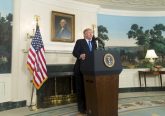 Last week, I gave a talk at Oxford’s Rothermere American Institute about the German historian Reinhart Koselleck (right) and the relevance of his conception of ‘historical time’ to the study of ideologies in America.
Last week, I gave a talk at Oxford’s Rothermere American Institute about the German historian Reinhart Koselleck (right) and the relevance of his conception of ‘historical time’ to the study of ideologies in America.
We are used to thinking about ideology as a pejorative term — a utopian blueprint for world order with all the consequences that totalitarianism brings. But this is a narrow view. Ideologies are, more broadly speaking, a particular type of political thinking that operates in-between political philosophy and what we can call ‘real politics’ — that is the practical doing (and thinking) that goes on in political life. By ‘in-between’ I mean distinct from philosophy and ‘real politics’, but not mutually exclusive to them. Ideologies are, to put it crudely, where ideas and political action meet; they are ideas with an active prescriptive component which aim for political influence. Ideologies are types of political thought that want to influence political conduct.
But what do ideologies look like? If they are not blueprints, what are they? The term has been rescued by recent scholars, some at Oxford, who see this type of political thought as ‘discursive’, that is a language of politics that is deployed to legitimate political action. What ideologies do, then, is to try and harness the meaning of political language — concepts like freedom, justice and equality — in order to motivate action. These words are everywhere in political discourse. My point is, though, that ideologies also want to compete over ‘time’ — that is by doing things like explaining the meaning of history (e.g. history is the rise of the working class), developing grand motivational narratives (e.g. theBook of Revelation), telling us what time looks like (e.g. progress) and whether time, say as progress, moves quickly or incrementally. Some of you may quibble that time could be anything and nothing. Who cares about time? Well that is exactly my point: ideologies compete over what time means just like they do language, and whether or not time is important is for an ideology, not me, to convince you.
Luckily there are a number of scholars, mostly German, who agree that time is an important component to political thinking. One of them is Reinhardt Koselleck, who studies the time elements contained within and revealed through historical language. To make a long story short, the use of words like ‘history’ or ‘revolution’ began to change at the end of the 18th century (at least in Germany) and the meaning of these words revealed a new outlook, or a new time (Neuzeit) — what he calls ‘historical time’. And it is in this new period where words like republic became republicanism and liberal became liberalism. Why? Well, according to Koselleck there is in this new ‘historical time’ a different outlook to the future, where words and the society that uses them are considered to be moving forward, leaving the past behind (feudalism, monarchy and all that) for a new, hopefully better, future (socialism, democracy, etc.). What I think Koselleck’s new time is talking about is, in fact, the emergence of political ideologies and all of the time elements that come with them.
What does this say about American ideologies? Quite a lot. But I will only elaborate on one of my points here. What is unique about political ideologies in America is the almost ubiquitous centrality of ‘the founding’ in ideological discourse. First, the founding is a new beginning — a new time — and much intellectual effort is made to differentiate these founding (‘American’) ideals from what came before. This time is also spatial: new time also happens in a new ‘uninhabited’ space. Recall Perry Miller’s Errand into the Wilderness. Ever since this temporal and spatial founding, American ideologies have been fighting over it. For conservatives America must return to the intent of the founders. Liberals, meanwhile, want a more progressive politics in order to finally meet or fulfil the spirit of these founding principles. Look at President Obama’s recent inaugural address, where he says:
What makes us exceptional, what makes us America is our allegiance to an idea articulated in a declaration made more than two centuries ago. We hold these truths to be self-evident, that all men are created equal.
That they are endowed by their creator with certain unalienable rights, and among these are life, liberty, and the pursuit of happiness. Today we continue a never ending journey to bridge the meaning of those words with the realities of our time. For history tells us that while these truths may be self-evident, they’ve never been self-executing. That while freedom is a gift from God, it must be secured by his people here on earth.
As President Obama’s words demonstrate, each American ideology is trying to control this founding, all important, moment in time, from which political progress (time) or stability (time) must gain its justification.
Alexander Ewing is a journalist and DPhil Student at Oxford. He is the Graduate Editor of Politics in Spires.
This post first appeared on the Events Blog of the Rothermere American Institute.







No Comment